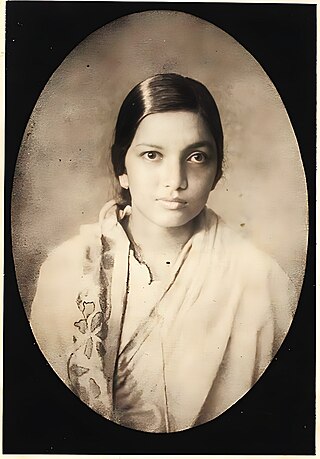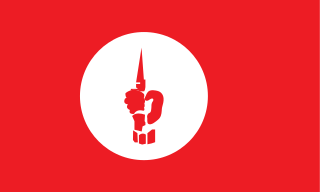
Bengal is a geopolitical, cultural and historical region in South Asia, specifically in the eastern part of the Indian subcontinent at the apex of the Bay of Bengal, predominantly covering present-day Bangladesh and the Indian state of West Bengal. Geographically, it consists of the Ganges-Brahmaputra delta system, the largest river delta in the world and a section of the Himalayas up to Nepal and Bhutan. Dense woodlands, including hilly rainforests, cover Bengal's northern and eastern areas, while an elevated forested plateau covers its central area; the highest point 3,636 metres (11,929 ft) is at Sandakphu. In the littoral southwest are the Sundarbans, the world's largest mangrove forest. The region has a monsoon climate, which the Bengali calendar divides into six seasons.

The All India Trinamool Congress, colloquially the Trinamool Congress is an Indian political party which is predominantly active in West Bengal. The party is led by Mamata Banerjee, the current Chief Minister of West Bengal, who has led the state since 2011. It is currently the third largest party in Parliament with 23 members in Lok Sabha and 13 members in Rajya Sabha and 235 MLAs in State legislative assemblies of India, just after BJP and INC. In 2016 the Election Commission recognised TMC as a national political party.

Bina Das was an Indian revolutionary and nationalist from West Bengal.

Ambika Chakrabarty was an Indian independence movement activist and revolutionary. Later, he was a leader of the Communist Party of India and a member of the West Bengal Legislative Assembly.
Niranjan Sengupta was a Bengali Indian revolutionary and freedom fighter. He was a leader of Communist Party of India (Marxist).
Manikuntala Sen was one of the first women to be active in the Communist Party of India. She is best known for her Bengali-language memoir Shediner Kotha, in which she describes her experiences as a woman activist during some of the most turbulent times in India's history.

Muzaffar Ahmad was an Indian-Bengali politician, journalist and a co-founder of Communist Party of India.

Ajoy Kumar Ghosh was an Indian freedom fighter and prominent leader of the Communist Party of India. He was the general secretary of the Communist Party of India from 1954 to 1962.

Kalpana Datta, also Kalpana Joshi, was an Indian independence movement activist and a member of the armed independence movement led by Surya Sen, which carried out the Chittagong armoury raid in 1930. Later she joined the Communist Party of India and married Puran Chand Joshi, the General Secretary of the Communist Party of India in 1943.

Assembly election was held in Indian state of West Bengal in 2011 to elect the members of West Bengal Legislative Assembly as the term of the incumbent government was about to expire naturally. It was held in six phases between 18 April and 10 May 2011 for all the 294 seats of the Vidhan Sabha.

Bankim Mukherjee was an Indian Bengali communist politician. He had taken part in the Civil Disobedience Movement, the Indian Communist movement and had organized various trade unions and Kisan sabhas. His wife Shanta Bhalerao was the Assistant Secretary of All India Trade Union Congress.

Hirendranath Mukhopadhyay, also known as Hiren Mukerjee, was an Indian politician, lawyer and academic. He was a member of the Communist Party of India having joined in 1936 when it was still illegal. He was elected to the Lok Sabha the lower house of the Indian Parliament from the Calcutta North East constituency in 1951, 1957, 1962, 1967 and 1971. He suffered an electoral reverse when he lost to Pratap Chandra Chunder in 1977 after the CPI supported Emergency.
The Bengali Hindu diaspora is the worldwide population of the Bengali Hindus of Indian and Bangladeshi origin.
The Language Movement in Manbhum was a movement in Manbhum district, present day Purulia district of West Bengal state, during the late 1940s to mid-1950s, to fight for the mother tongue which is a variation of Bengali language and to protest the introduction of the Hindi language in West Bengal.

The Mukti Bahini, also known as the Bangladesh Forces, was the guerrilla resistance movement consisting of the Bangladeshi military, paramilitary and civilians during the War of Liberation that transformed East Pakistan into Bangladesh in 1971. They were initially called the Mukti Fauj.

Saroj Dutta popularly known comrade SD, was an Indian communist intellectual and poet, active in the Naxalite movement in West Bengal in the 1960s. He was the first West Bengal state secretary of Communist Party of India (Marxist-Leninist). He also remained editor-in-chief of the Amrita Bazar Patrika during the 1940s.

Geeta Mukherjee was an Indian politician and social worker and a four times MLA from Panskura Purba, from 1967 to 1977. As a Member of Parliament, she was elected seven times from the Panskura constituency, from 1980 to 2000, in the Indian state of West Bengal being a Communist Party of India (CPI) candidate. She also remained the president of National Federation of Indian Women, women's wing of Communist Party of India. She led the demand for the legislature of 1/3rd reservation for women in parliamentary elections in India.
The West Bengal Legislative Assembly election, 1967 was held in Indian state of West Bengal in 1967 to elect 280 members to the West Bengal Legislative Assembly. United Front led by Ajoy Mukherjee won majority of seats in the election, and formed first non-Congress government of the state.
Legislative Assembly elections were held in the Indian state of West Bengal in 1991. The election took place simultaneously with the 1991 Indian general election. The term of the assembly elected in 1987 lasted until February 1992, but the West Bengal government asked the Election Commission of India to arrange the election at an earlier date.
Anarchism in Bangladesh has its roots in the ideas of the Bengali Renaissance and began to take influence as part of the revolutionary movement for Indian independence in Bengal. After a series of defeats of the revolutionary movement and the rise of state socialist ideas within the Bengali left-wing, anarchism went into a period of remission. This lasted until the 1990s, when anarchism again began to reemerge after the fracturing of the Communist Party of Bangladesh, which led to the rise of anarcho-syndicalism among the Bangladeshi workers' movement.













